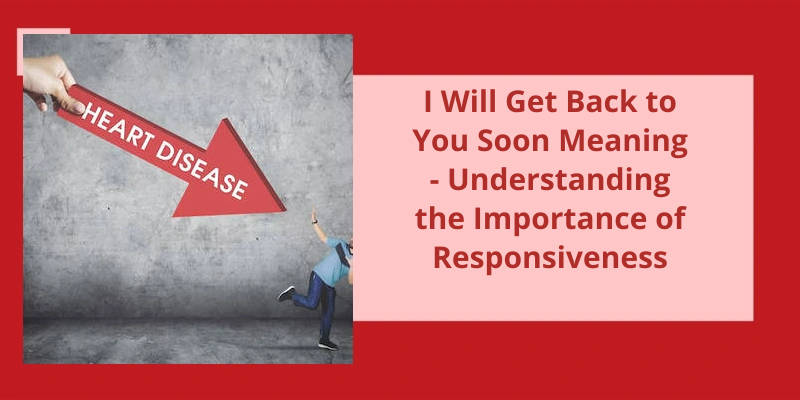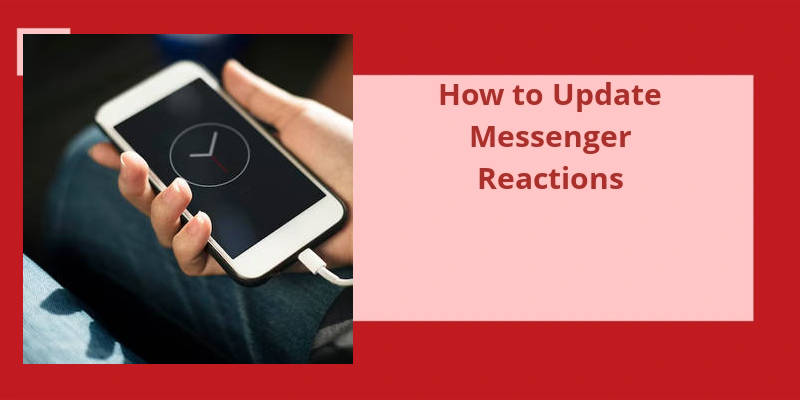"I Will Get Back to You Soon Meaning: Understanding the Importance of Responsiveness". In our fast-paced and interconnected world, maintaining effective communication is paramount. Among the many phrases we use to acknowledge receipt of a message or request, "I’ll get back to you soon" holds a significant place. It’s meaning stems from the essence of responsiveness, conveying the intention to provide a timely and informative response. This idiomatic expression reassures the recipient that their query has been duly acknowledged and that efforts will be made to promptly address their concerns. The promise to "get back" signifies the speaker's commitment to circling back with an answer, solution, or necessary information, ensuring that open dialogue continues to flourish. This willingness to prioritize responsiveness reflects the importance attributed to effective communication practices, fostering trust, reliability, and mutual understanding between parties.
Is It Correct to Say Let Me Get Back to You?
Using the phrase “I’ll get back to you” is a polite and professional way to respond when you don’t have an immediate answer. It shows that you value the persons inquiry and are committed to finding the information they need. Saying “let me get back to you” is also acceptable and conveys the same intention.
By using this phrase, you’re acknowledging that you may not have all the necessary information at the moment and need some time to gather it. This demonstrates your commitment to providing accurate and well-thought-out responses.
The importance of responsiveness in professional communication can’t be overstated. When you promise to get back to someone, it’s essential to follow through. Timely responses help build trust and strengthen professional relationships. It shows that you’re reliable and take their concerns seriously.
When you tell someone that you’ll get back to them, it’s crucial to set clear expectations regarding when they can expect a response from you. It could be within a specific timeframe or when you’ve obtained the required information. Keeping the other person informed about the progress of your research or decision-making process is also essential to maintain transparency.
Taking the time to provide a thoughtful and well-informed response reinforces your professionalism and dedication to addressing the persons needs. Whether in a business setting or personal conversation, using phrases like “I’ll get back to you” helps maintain effective communication and shows respect for the other persons time and inquiry.
Sometimes, you may need time to gather information or think through a response before getting back to someone. In these situations, it’s important to communicate your intention politely and effectively. Here are 15 examples of phrases you can use to express that you’ll get back to someone.
How Do You Politely Say I Will Get Back to You?
When it comes to professional communication, it’s essential to be responsive and not leave others hanging. One way to politely convey that you need more time or information is by saying “I’ll get back to you.”. This phrase indicates that you recognize the importance of their message and will address it as soon as possible.
There are various ways to express this intention to get back to someone. For instance, you can use phrases like “I’ll follow up with you” to indicate that you’ll be in touch with them regarding the matter at hand. Similarly, stating “I’ll have an answer on that shortly” lets the other person know that a response is imminent. This shows that you value their time and are actively working on their query.
In some cases, you may need to investigate or research the topic before providing a thorough response. In such instances, you can say “Ill investigate this and let you know what I find out” or “Let me research that and get back with you.”. These phrases convey your dedication to finding accurate information and ensuring that your reply is well-informed.
In situations where an immediate response isn’t possible, you can use phrases like “Let me get back to you on that” or “Ill get back to you on that ASAP.”. These expressions demonstrate your commitment to addressing their concerns as soon as you’re able to. By using these phrases, you acknowledge their message and assure them that you won’t forget about it.
Overall, the phrase “I’ll get back to you” serves as a polite and professional way to inform others that you’ll address their query or request in the near future. It conveys the importance of responsiveness in effective communication and shows that you’re actively working on finding a solution or providing an answer. By using variations of this phrase, you can cater your response to the specific situation, ensuring that your intention to reply is clear and professional.
Strategies for Organizing Your Inbox or Message Notifications to Ensure You Don’t Miss Any Important Messages or Requests.
Organizing your inbox or message notifications is crucial to ensure you don’t miss any important messages or requests. By implementing effective strategies, you can increase your responsiveness and provide better communication. Here are a few tips:
1. Prioritize: Sort your messages based on their importance or urgency. Create categories or labels, and use filters to automatically organize incoming emails or notifications.
2. Set up folders: Create folders based on specific topics or projects. Move relevant messages into these folders to keep your inbox clutter-free and easily accessible.
3. Flag or star important messages: Use flags or stars to mark important messages that require immediate attention. This way, you can quickly identify and respond to them while managing other less urgent messages.
4. Use email filters: Utilize email filters to automatically sort incoming messages based on specific criteria such as sender, subject, or keywords. This can help you prioritize and streamline your inbox.
5. Schedule dedicated time: Allocate specific times in your day to handle emails or message notifications. This dedicated time allows you to focus on responding promptly without interruptions, ensuring a timely response.
6. Set up notifications: Enable notifications on your devices to receive alerts for important messages or requests. This way, you can stay updated even when you aren’t actively checking your inbox.
By implementing these strategies, you can effectively organize your inbox or message notifications and improve your responsiveness. This ensures that you never miss any important messages and maintain effective communication with others.
However, there are various reasons why someone may say these words without actually following through. It may be a polite way of ending a conversation or buying more time to consider a response. In this article, we will explore the different interpretations and underlying factors behind the phrase “I’ll get back to you” to help decipher it’s true meaning in different contexts.
What Does It Mean When Someone Says I’ll Get Back to You?
When someone tells you, “Ill get back to you soon,” it’s commonly understood as a commitment to respond or communicate with you. However, the true meaning behind this phrase can often vary. In some cases, it genuinely reflects the persons intention to follow up and provide a timely response. It shows a level of respect and consideration for your communication.
Nonetheless, there are instances where the phrase is used as a polite way of saying that they might not respond or get back to you at all. While it may seem disheartening, it’s essential to understand that people lead busy lives, and their priorities can shift. It’s possible that they’re genuinely unable to respond immediately due to various reasons such as overwhelming workload, personal issues, or simple forgetfulness.
In todays fast-paced digital world, it’s become increasingly common for messages to slip through the cracks. With the constant influx of emails, texts, and notifications, it can be challenging to keep up with all the correspondence. Despite good intentions, individuals may find themselves overwhelmed, resulting in a delay or outright failure to respond. It’s crucial to remember that this lack of response doesn’t necessarily reflect poorly on you or the importance of your message; it often represents the other persons circumstances and priorities.
Moreover, it’s essential to consider the nature of your relationship with the person who’s told you they’ll get back to you soon. If it’s a colleague, client, or someone with whom you’ve a professional relationship, it’s reasonable to expect a prompt response as part of good business etiquette. However, with friends, acquaintances, or casual connections, the level of expectations may differ. Impromptu plans or conversations may take a backseat to other commitments, and the phrase “Ill get back to you soon” could signify a more indefinite timeframe.
Understanding that people have different priorities, circumstances, and challenges can help manage expectations and avoid unnecessary frustration. Communication breakdowns happen, and it’s important to maintain patience and understanding while waiting for a response.
How to Gracefully Remind Someone to Get Back to You Without Being Pushy
- Send a friendly follow-up message expressing your interest in hearing back
- Use a polite tone when asking for an update on their response
- Offer a brief recap of the previous conversation to jog their memory
- Suggest a convenient time for them to respond, if applicable
- Keep your message concise and to the point
- Mention any time-sensitive aspects that require their attention
- Show understanding and patience in your communication
- Avoid applying unnecessary pressure or sounding demanding
- Express gratitude for their time and consideration
Source: What does ”Ok I’ll get back to you” mean?..
Conclusion
In today's fast-paced and interconnected world, understanding the importance of responsiveness has become crucial. The phrase "I’ll get back to you soon" carries a deeper meaning than just a promise to respond. It signifies a commitment to prioritize communication and maintain a sense of reliability. When someone says they’ll get back to you, they’re assuring you that they’ll gather the necessary information, consider your inquiry, and provide a thorough and thoughtful response. The phrase embodies a mutual respect for time and the recognition that clear and prompt communication is the foundation of fruitful relationships. Whether it's in professional settings or personal interactions, being responsive exhibits attentiveness, dependability, and a genuine interest in fostering effective collaboration. Embracing the true meaning behind this phrase can ultimately enhance productivity, build trust, and strengthen connections in all areas of life.






